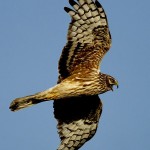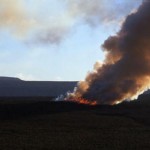
In the same, current, issue of BBC Wildlife magazine in which I am ‘quoted’, so is Tim Baynes of the Scottish Land and Estates.
He gets 50+ words to explain why we need grouse shoots.
He gets off to a very bad start in a wildlife magazine by writing ‘The red grouse is the only bird unique to the UK‘. Not true. Not true at all. The Red Grouse is a race of the Willow Grouse or Willow Ptarmigan which is found widely across Europe and North America (click here and here). So, it’s not a unique species to the UK and there are lots of British subspecies of bird – loads of them.
Tim goes on next to write: ‘Management has ensured the survival of the species, while the bird has almost died out on unmanaged moorlands in the west of the UK.‘ Let’s go back to the first point – the species has an enormous world range in which driven grouse shooting is an eccentric British pastime – Red Grouse don’t need shooting to survive.
Have a look at the Atlas data to check how accurate you think Tim is. Red Grouse have certainly lost some ground since the first breeding Atlas (in the east and the west, and the south too) but there are lots of Red Grouse away from those areas in the east and south of Scotland, and northern England, where driven grouse shooting predominates. Most of those grouse are living quite happily at low densities not being ‘farmed’ for grouse shooting. And they are living alongside, and sometimes being eaten by (that’s life!) Hen Harriers. There are certainly high densities of Red Grouse on grouse moors – there are higher densities of chickens in battery farms than there are Red Junglefowl in jungles – and your point is?
We can expect further losses of range of Red Grouse due to habitat loss and, quite interestingly, climate change (see here and here).
On moors managed for driven grouse shooting Red Grouse numbers are maintained at artificially high densities so that there are lots to shoot. It’s pretty obvious that Red Grouse didn’t need this type of management for tens of thousands of years and pretty obvious that they don’t depend on it now. Grouse shooting needs Red Grouse to kill, but Red Grouse don’t need grouse shoots to survive.
That’s more than half of Tim’s words and he hasn’t got too much right so far.
He goes on to say: ‘Grouse management is also proven to look after rare upland birds such as black grouse, curlew, lapwing and golden plovers….‘ Yes, there is quite a lot of truth in this – although ‘declining’ would probably be a better word than ‘rare’ to be more accurate. If you want to talk about rare birds, Tim, then try the Hen Harrier – 2 pairs in England last year and it should be more than 100 times more numerous.
Driven grouse shooting is certainly not the only management that is quite good for some of these species. Black Grouse would do better with more trees and Golden Plover might benefit from less burning of blanket bog but the general point that grouse moor management supports higher densities of some species is true.

And Tim ends by playing the ‘money’ card: ‘…while shooting brings in the income to pay for wildlife management.’ Well, that is a bit of an exaggeration isn’t it? Many grouse moors are designated because of their wildlife interest – often their past wildlife interest – often the former populations of Hen Harriers that no longer inhabit those grouse moors because they have been persecuted to virtual extinction on British grouse moors. And most grouse moors are farmed too. Therefore, your and my money goes into helping to pay for the management of those grouse moors through wildlife payments and agricultural payments, such as those received by the Walshaw Moor Estate (see 45 blogs on the subject starting here and ending (so far) here and see photos of grouse moor management here and here).
There are great concerns over the value of moorland management that is so focussed on maintaining very high unnatural densities of one species so that it can be shot – see here and here for example. The National Trust is aiming to breathe new life into the uplands by moving away from the very management that Tim Baynes is seeking to defend. And George Monbiot has a rather different take on the money going to support driven grouse shooting.
I haven’t even mentioned the wonderful photographs and article to which Tim Baynes’s and my comments are simply small footnotes yet – I will, a bit later.
And by the way – thank you for the continuing emails of interest and support for peaceful protests against Hen Harrier persecution which will take place on 10 August.
[registration_form]
How many Hen Harriers fledged on Langholm Moor last season?
Peter – no idea.
According to Cat Barlow’s blog the answer is 10.
and here part of a recent entry from her blog – well worth a read:
May is proving to be a fantastic month on the moor, the weather is little unpredictable with rain showers never far away. The harriers are keeping us on our toes, some are settled but new birds keep appearing. Harrier, Merlin and Short eared Owls views have been fantastic, the high vole numbers this year mean the raptors are making the most of this food source.. fingers crossed the vole numbers stay high and we have a bumper year of young harriers, short eared owl and merlin.
We have been enjoying some incredible views of Short Eared Owls – hunting, displaying and involved in territorial disputes..
Just a thought…
But perhaps Tim Baynes’ comments have been edited to oversimplify, misrepresent and exclude the caveats that he originally stated when they asked him to write for them
Possible? Do you think that the BBC magazine would do something like that?
Seems a bit, shall we say, strange (!) to try and pull apart the accuracy of what was published, when you’re complaining that they carved up your own stuff to the point of it being unrecognisable…
kie – you put words in my mouth. Funny that. The great joy of having a blog is that people can read what I wrote and see it for themselves.
I wrote everything that BBC Wildlife printed – I wish they’d printed it all or asked for 50 words to start with. Yes, maybe Tim feels the same – I have no idea. I expect he wrote what they have printed – and it’s not very accurate is it?
I welcome Guest Blogs on this site.